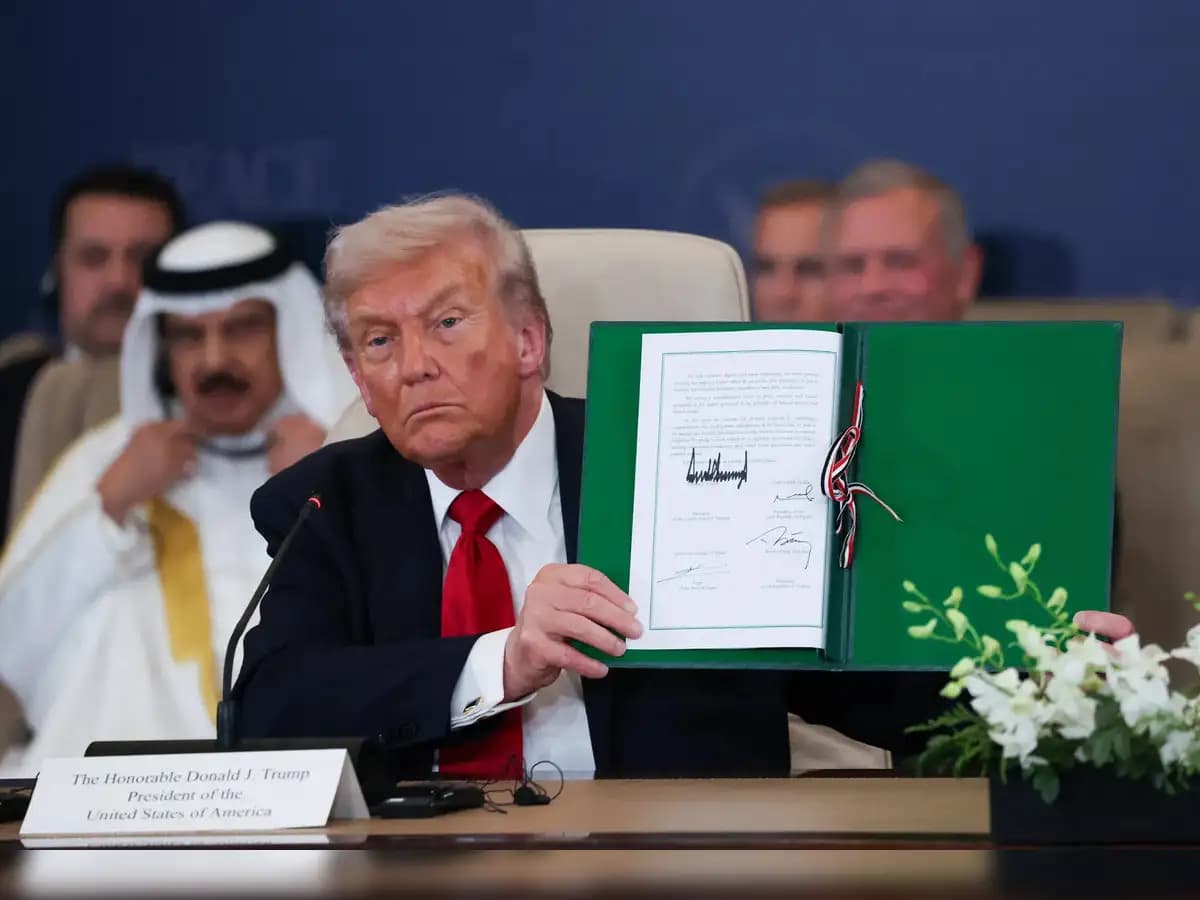We're loading the full news article for you. This includes the article content, images, author information, and related articles.
Former US President Donald Trump announced a historic peace agreement in Gaza, a development that could significantly influence global affairs and prompt Kenyan stakeholders to seek clarity on the implications for local policy and development.

Former US President Donald Trump declared on Monday, October 13, 2025, that the 'prayers of millions have finally been answered' following the signing of a US-brokered peace plan aimed at ending the two-year conflict in Gaza. The announcement came after Hamas released all 20 remaining living Israeli hostages, a critical first step in the multi-phase deal.
Speaking at a summit in Sharm El Sheikh, Egypt, where over 20 world leaders gathered, Trump hailed the diplomatic breakthrough, stating, 'at long last, we have peace in the Middle East.' He and the leaders of Egypt, Turkey, and Qatar signed a declaration as guarantors of the accord. The initial phase of the deal included a ceasefire that took effect on Friday, October 10, 2025, and an Israeli military pullback.
The peace agreement follows a two-year war in Gaza, sparked by a terrorist attack on October 7, 2023. As part of the first phase, Israel is expected to release approximately 2,000 Palestinian prisoners and detainees. While Trump declared the war over, many details of a long-term plan remain subject to negotiation. The White House released a peace declaration signed by Trump and Middle Eastern leaders, which calls for 'peace, security, stability, and opportunity for all peoples of the region, including both Palestinians and Israelis,' and emphasizes resolving future disputes through 'diplomatic engagement and negotiation rather than through force or protracted conflict.'
In Kenya, recent policy developments often spark public debate and scrutiny, with various stakeholders calling for clarity on timelines, costs, and safeguards. Kenya has historically faced challenges in policy implementation, including insufficient funding and political interference. The media plays a significant role in shaping public discourse and influencing policy decisions in Kenya.
The potential ripple effects of US political developments are closely monitored by Kenyan officials and citizens due to their impact on bilateral relations, particularly concerning trade, security, and development aid. For instance, Kenya's designation as a Major Non-NATO Ally in May 2024 under the Biden administration was a significant milestone, offering various benefits. Any review of foreign commitments by a future US administration could affect this status and associated benefits.
Domestically, Kenya's Parliament frequently debates government policies. For example, in July 2025, MPs debated various reports, including the annual report from the Office of the Controller of Budget and the auditor general's report on political parties. There have also been debates on controversial bills, such as one in August 2024 that sought to restrict citizens' right to assembly, drawing international condemnation for excessive use of force by police against peaceful demonstrators.
Kenyan stakeholders consistently advocate for transparency and accountability in policy execution. For example, in October 2024, a study by IDinsight highlighted significant gaps in how devolved healthcare levels account for funds, making it difficult to demonstrate how these funds contribute to outcomes like reducing child mortality. Dr. Frida Njogu Ndongwe, IDinsight's Regional Director for East and Southern Africa, emphasized the need to align financial and health outcome data to ensure public money is effectively used.
While the Gaza peace deal has been lauded, major questions about what comes next remain unanswered, and the peace remains fragile. The declaration signed by world leaders offers few specifics on the path forward. For Kenya, shifts in US foreign policy, particularly concerning aid and partnerships, could have significant implications for the continuity of existing agreements.
Domestically, the ongoing debate about Nairobi's governance, with some urban planners suggesting it should be managed directly by the national government due to its vastness and complexity, highlights the challenges in effective policy implementation at the county level.
Despite the celebratory tone, the absence of Israeli Prime Minister Benjamin Netanyahu and representatives from Hamas at the signing ceremony in Egypt raised questions, with Netanyahu's office citing a Jewish holiday as the reason. Furthermore, while Trump declared the war over, the remains of 24 deceased Israeli hostages are still held by Hamas.
In a separate development, former President Trump has publicly praised parts of 'Project 2025,' a policy agenda, calling them 'very conservative and very good,' while also distancing himself from other aspects of the 900-page document. This project outlines a hard-right turn in American government and society, with potential implications for various international policies, including climate agreements.
The initial phase of the Gaza peace deal, including a ceasefire and hostage release, commenced on Friday, October 10, 2025, and Monday, October 13, 2025, respectively. The rebuilding of Gaza is expected to be a significant undertaking, with wealthy countries pledging financial support.
Observers will be keenly watching the implementation of the Gaza peace agreement, particularly the release of Palestinian prisoners and the long-term stability of the region. The specifics of the rebuilding efforts in Gaza and the continued engagement of international partners will also be crucial. In Kenya, the ongoing public discourse on policy implementation, accountability, and the potential impact of global political shifts on local development will remain a key area of focus for journalists and citizens alike.
Keep the conversation in one place—threads here stay linked to the story and in the forums.
Sign in to start a discussion
Start a conversation about this story and keep it linked here.
Other hot threads
E-sports and Gaming Community in Kenya
Active 9 months ago
The Role of Technology in Modern Agriculture (AgriTech)
Active 9 months ago
Popular Recreational Activities Across Counties
Active 9 months ago
Investing in Youth Sports Development Programs
Active 9 months ago